Books
Some books that I read after creating this page.
I love reading for both recreational consumption and educated execution. I don’t like to read for facts but for absorbing patterns and mindsets. Therefore fiction and non-fiction both serve the purpose.
Some might say that fiction is just well written entertainment, but storytelling plays a vital role in shaping who we are and how we present ourselves.
Never tried audiobooks. I sleep if I listen to podcasts if they are just audio. So I prefer going through transcripts.
You might want to look at How I learned to stop worrying and start reading
And this tweet by illacertus
Aiming at less than 100 solid books. Anything beyond that is madness. I'm after educated execution, not recreational consumption.
— illacertus (@illacertus) September 24, 2016
40 rules of love⌗
“Sweet Blasphemy” would have been such an apt and less tacky name. Reading it makes you more kind and less judgemental. A beautiful love story and filled with wisdom.
The 40 rules themselves are phony, pointless and sometimes corny. Had a good time reading it. The pace takes a while to pickup.
Though, there are inconsistencies in between compared to how skillfully other parts are written. I love how author writes convincing first person narratives without leaking through the characters herself.
Kafka on the shore⌗
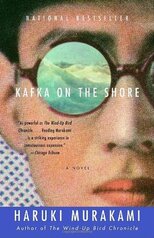
Great book. If you want to read magical realism, don’t bother with 100 years of solitude, pick this up. It will make more sense (relatively).
Plays like a Ghibli studio movie in your head. Last 10% is straight out of Howl’s moving castle. Reminds me of Paulo Coelho’s Brida and Eleven minutes at times. Full of beautiful lines. I highlighted a lot.
Murakami is raw and honest, pulls no punches. Part of the reason why I still prefer reading books is that they’re not incentivized to hide how real people feel and what they do. Characters aren’t desexualised or lobotomized to get some censor rating so that more people can read the book and it can rake in more money.
You read literature, because you can’t meet enough people (I guess Mark Manson said that). You meet a lot of fully developed characters here. Even the characters introduced in the second half like Hoshino and Sanders become too familiar and real as if they were at the center stage from beginning.
Something that bothers me is whenever any character starts discussing music they all become Murakami and no longer remain the same character. They start speaking in the voice of narrator, sharing same vocabulary and taste no matter what their age, profession and life experiences are.
Listen, every object’s in flux. The Earth, time, concepts, love, life, faith, justice, evil—they’re all fluid and in transition. They don’t stay in one form or in one place forever. The whole universe is like some big FedEx box.
The Metamorphosis⌗
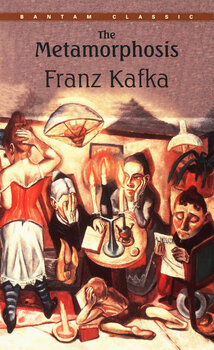
Story is not much. I was only able to underline about 14-15 lines but they convey too much. So it can be used as a class in writing and psychology.
As an example
“She’s absolutely right”, said Gregor’s father to himself. His mother, who still had not had time to catch her breath, began to cough dully, her hand held out in front of her and a deranged expression in her eyes.
This interaction is representative of all the scenes where a group of people have to decide fate of someone they consider as burden or may become a hindrance to their survival or let’s say comfort. The process they follow to achieve a consensus is almost similar.
One guy supporting the radical decision, others picking up after him and some member like Samsa’s mom who are too scared to accept that they support the decision.
Then few more arguments to convince themselves that they’re not doing anything wrong.
How can that be Gregor? If it were Gregor he would have seen long ago that it’s not possible for human beings to live with an animal like that and he would have gone of his own free will. We wouldn’t have a brother any more, then, but we could carry on with our lives and remember him with respect. —
Story of your life and others⌗
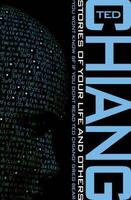
Selection of some of the best stories by Ted Chiang. He explores a world to an extent that you stop thinking it is not real. All details are thought through so well.
I didn’t like the one on which Arrival is based and the tower of Babylon. Maybe it was because I read Project Hail Mary first and detailed interaction between two species for learning each others language is almost similar there. So it lost its novelty by the time I read Arrival.
Best ones are Liking what you see, Hell is absence of God, The Merchant and the Alchemist’s Gate and Understand
“Dermatology” computer virus. This virus has begun infecting video servers around the world, altering broadcasts so that faces and bodies exhibit conditions such as acne and varicose veins.
Lifecycle of Software Objects⌗
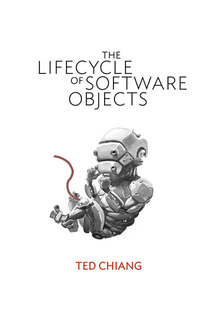
Feels like a 5 hour long movie. Resonates because you might have seen this pattern over and over in your life. A startup pioneers new tech, everything goes well until they run out of time to figure out how to make the business profitable. Now when they pull the plug and shut down the shop, hobbyists, tinkerers and fanboys are left behind. Finding ways to make whatever they’re left with work. Forming communities. Things aren’t fun anymore.
I don’t have any pets, but pet and parent dynamics explored here do evoke emotions. And, what a book cover.
They’ve created an engine that favors asocial behavior and obsessive personalities. The vast majority of the digients generated with the engine are discarded for their psychological malformations, but a tiny fraction prove capable of learning with minimal supervision: give them the right tutoring software and they’ll happily study for weeks of subjective time, meaning that they can be run at hothouse speeds without going feral
Designing Distributed Systems⌗
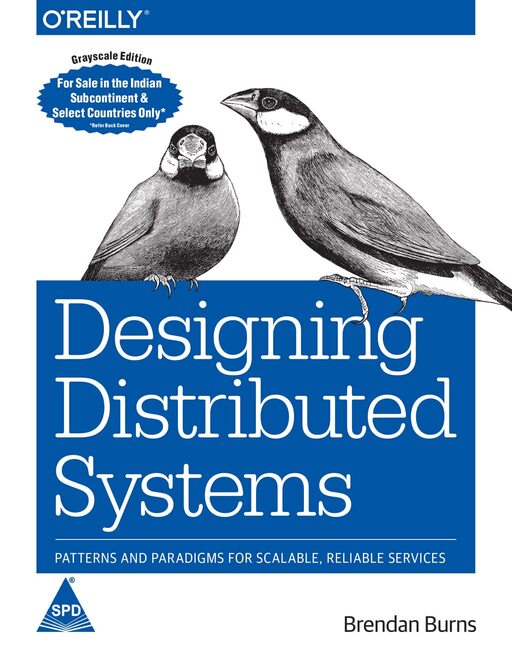
This is a densely packed book. You must read if you deploy your code in cloud, almost everyone does. Cloud, because book leans towards container orchestration. Collection of common deployment patterns like sidecar, ambassador and adapters, constructs like workqueue are explained in detail with dedicated sections.
Unlike DDIA, this is hands on. Yamls which can be applied to a k8s setup are sprinkled throughout.
God knows if they’re up to date.
Designing Data Intensive Applications⌗
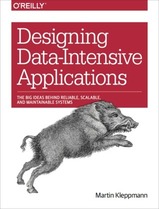
Book is hyped up for a good reason. It doesn’t matter if you’re working on data intensive systems or not. It covers enough topics to benefit anyone who reads it, whatever earlier knowledge they have. It makes no assumptions.
Reading it is an eye opening experience when you realize how tweaking fairly simple things like enforcing schema while reading or writing can have effect on what kind of guarantees your system provides. I didn’t know you can do it in two ways, forget about guarantees.
Key learning is there are no be all and end all solutions, choosing what will work totally depends on the context, usecase and resources. Book makes it a point to showcase all the available solutions for a problem that author could think of or find.
One reading doesn’t do justice to it, even if you make notes. If you read one technical book this year, make it this one.
Data outlives code
Effective Engineer⌗
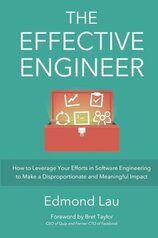
It has two major ideas - prioritize high leverage tasks, make feedback loops shorter. Rest of the book is examples, techniques and action plans to adopt, practice and exploit these ideas.
There are other tangential advice which are useful but look so trivial on face value that you tend to ignore it until you face the repercussions in real life.
For example “Don’t defer approvals till the end” looks like a very innocent piece of advice. Even after knowing this fully well, I’ve failed in following it many times and I know a lot of people who make the same mistake.
So reading the book and making notes is half the battle. Must read even if you’re not planning to be an engineer for long.
Even still, given the benefits of good metrics, it’s worth asking yourself: Is there some way to measure the progress of what I’m doing? If a task I’m working on doesn’t move a core metric, is it worth doing? Or is there a missing key metric?
Project Hail Mary⌗
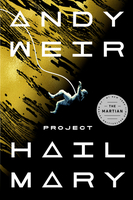
This book is so good. No wonder it was best sci-fi of 2021. All stars including Sun are losing their shine to an alien life form. A parasite, similar to nanomites in G.I. Joe Rise of Cobra. One star far away is immune to this. Earth sends a one way mission to that star as the last hope of saving Sun from dimming further. Out of three, two crew members didn’t survive coma.
Story is told in two timelines, Ashwin Sanghi style.
Most readable book you can pick up. I wonder how some writers manage to write characters smarter than them. You learn from the protagonist a lot. How to not rest the case on assumptions and thinking from first principles. Carrying out systematic experiments to figure out things. Not giving up.
I read it during two 4 hour flights. Sound of aeroplane engine and occasional turbulence elevate the reading experience as most of the story is in a spaceship.
Some may say, Ryland grace is Mark Whatney with K-12 science facts stuffed into him, but I enjoyed the book.
I start to hyperventilate. “We’re dead in space. We’re stuck here forever.” “Not forever,” Rocky says. I perk up. “No?” “No. Orbit decay soon. Then we die.”
Foundation⌗

Early job descriptions of Directi mentioned remembering planets in Foundation as a nice to have. I don’t dig science fiction written by authors of previous generation. H.G. Wells and PKD are exceptions. Contemporary authors like Ted Chiang and Andy Weir write more relevant and gripping stories.
Read this because it is a popular classic, not planning to read other books in the series.
Religion is one of the great civilizing influences of history and in that respect, it’s fulfilling.
Beowulf⌗

Watched animated movie on fast forward. Then read the book, translation by Seamus Heaney. Some parts are unclear or incoherent. Took a lot of effort to complete, which wasn’t worth it at all. Zemeckis movie is better.
Do not give way to pride. For a brief while your strength is in bloom but it fades quickly; and soon there will follow illness or the sword to lay you low, or a sudden fire or surge of water or jabbing blade or javelin from the air
Flowers for Algernon⌗
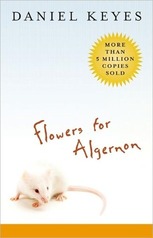
A novella. Man with an IQ of 68 triples his IQ after treatment. Story is first person account of these changes. So quality of writing waxes and wanes with the IQ.
“Shut up! Leave him alone! It’s not his fault he can’t understand! He can’t help what he is! But for God’s sake he’s still a human being!”
Einstein’s Dreams⌗
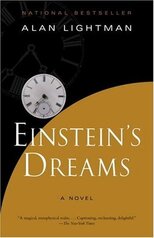
Short and evoking read. Every chapter is a new world where concept of time is different from others.In one world there is no past, in another everything is a picture (fodder for stable diffusion). Somewhere time passes slower if you’re in motion, everyone is obsessed with speed and knows no rest.
Barring few chapters, all the worlds have some similarity to how humans perceive time. How we think that we have all the time in the world or no time at all. Time stands still once in a while and at times actions are not dictated by what happened in the past. I’m just reading too much between the lines.
A book of 30 thought experiments.
The chapter where everything is a picture has interesting prompts for generating images. I created one here
Some say it is best not to go near the center of time. Life is a vessel of sadness, but it is noble to live life, and without time there is no life. Others disagree. They would rather have an eternity of contentment, even if that eternity were fixed and frozen, like a butterfly mounted in a case.
High Output Management⌗
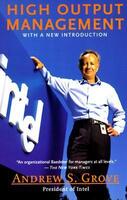
It is like THE BOOK for MANAGERS but presents clever ideas that can be used by anyone. For example the idea that material becomes more valuable as it moves through the process, can be used to optimize any process you’re working with whether it is conveyor belt in a factory or a CI pipeline.
Andrew starts with an example of running a diner that serves a simple breakfast and how things change and the challenges you face when it scales to a breakfast factory. This might be the book every manager might have read or will be familiar with the ideas discussed in it. Therefore it is worthwhile to read to get a language and framework to understand how middle managers operate and make sense of what is going around.
Tobi Luetke read it while transitioning to CEO of shopify.
At Intel, we put ourselves through an annual strategic long-range planning effort in which we examine our future five years off. But what is really being influenced here? It is the next year—and only the next year. We will have another chance to replan the second of the five years in the next year’s long-range planning meeting, when that year will become the first year of the five
Dune⌗

Read it because 2021 movie ended prematurely. There are many concepts I find interesting in the universe of Dune. For example, training someone since birth to do calculations like computer because relying on machines to do this is bad. Planting prophecies across planets to bend locals. Still-suits, shields, ornithopters. Selective breeding by Bene gesserit. World building, treatment of politics & environment make it a worthwhile read.
Ending was underwhelming & I don’t feel like reading any sequels.
When religion and politics travel in the same cart, the riders believe nothing can stand in their way. Their movement becomes headlong—faster and faster and faster. They put aside all thought of obstacles and forget that a precipice does not show itself to the man in a blind rush until it’s too late
Little Prince⌗

Again a popular book, used to see it a lot on back cover of NCERT books. Didn’t understand much of it except that according to narrator adults lack imagination and understanding.
Maybe it is one of those which require re-re-reading to get them. Starting few chapters felt just like Nate the Snake.
He is the only one of them all who does not seem to me ridiculous. Perhaps that is because he is thinking of something else besides himself
Missing Readme⌗

Directed towards new Software engineers, won’t hurt skimming through some chapters you if you’re not.
Great book if you’re starting out like me.
Discusses things that you probably don’t have any idea about like
- navigating enormous codebase without documentation
- Design docs, better PR reviews, impostor syndrome (not always true, sometimes you’re right)
- 1:1 with managers and the jargon like OKR, KPI, NFR.
- Oncalls, TDD, conventions that teams take for granted that you must be knowing about and many similar things
Great book, doesn’t matter if you’re starting out or not.
Use divide and conquer or a binary search (also called half-splitting) on bigger systems. Find a point halfway through the call stack and see if the problem is upstream or downstream of the issue. If the problem is upstream, pick a new component halfway upstream; if it’s downstream, do the reverse. Keep iterating until you find the component where you believe the problem is occurring.
Old man and the Sea⌗
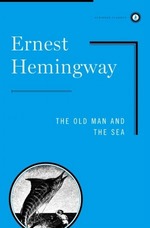
Famous book. Engaging. Good story. That’s the review
Everything you read doesn’t need to have a lesson, moral or a cool idea waiting to be discovered :)
“Age is my alarm clock,” the old man said. “Why do old men wake so early? Is it to have one longer day?”
Pragmatic Thinking⌗
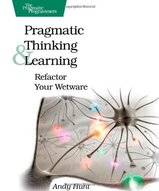
Book explains how human brain works from a Software engineer’s perspective. Using computers as props to support the analogy. Core themes are ways to improve learn, work & author’s wisdom on software engineering as a profession.
One thing that stuck with me was how brain switches between L mode and R mode and how to leverage that for inspired solutions.
Written well, I couldn’t move past one chapter of Pragmatic programmer but reading it was effortless.
You can instantly realize productivity gains of 20 to 30 percent just by getting yourself a second monitor, regardless of how you measure productivity.
Picture of Dorian Grey⌗
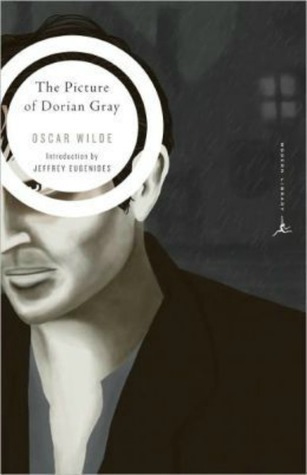 Before this the only works that I ever read by Oscar Wilde were The Selfish Giant and Canterville Ghost. Latter is
what everyone was forced to read in 11th standard, which is too immature for students in 11th standard. At least Gulliver travels had more complex themes.
Before this the only works that I ever read by Oscar Wilde were The Selfish Giant and Canterville Ghost. Latter is
what everyone was forced to read in 11th standard, which is too immature for students in 11th standard. At least Gulliver travels had more complex themes.
The selfish Giant was good. Picture of Dorian Grey is a book on Faustian bargain, but you never see the devil here. More than the story of the book, I liked reading how Lord Henry has an entertaining opinion on everything.
It is held back at some places or censored, but movies do a good job in extrapolating those parts.
Women, as some witty Frenchman once put it, inspire us with the desire to do masterpieces and always prevent us from carrying them out.
Brave New World⌗
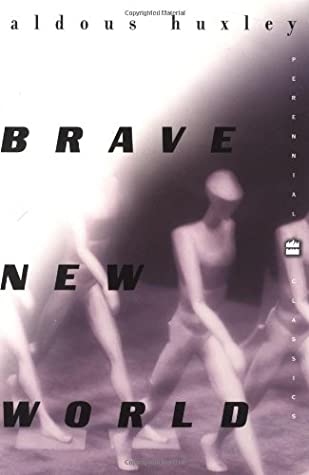
As Neil Postman says there were two visions of the future one was 1984 and the other created by Huxley in brave new world. Opening chapter is very engaging and well thought out then it transforms into Logan’s Run.
At this point things like misinformation, short attention spans, intoxication to escape reality and racism is so mainstream that it doesn’t ring any bells when you read about it again and again in a ninety year old book.
You must read the first chapter though.
You can’t make flivvers without steel—and you can’t make tragedies without social instability. The world’s stable now. People are happy; they get what they want, and they never want what they can’t get. They’re well off; they’re safe; they’re never ill; they’re not afraid of death; they’re blissfully ignorant of passion and old age; they’re plagued with no mothers or fathers; they’ve got no wives, or children, or lovers to feel strongly about
I am legend⌗
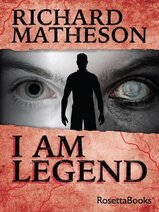 I want to read more such stories where protagonist is alone on entire planet. This book inspired a completely new genre of movies, all of Romero’s and other zombie apocalypse movies, but more
than vampires it is a study of human loneliness.
I want to read more such stories where protagonist is alone on entire planet. This book inspired a completely new genre of movies, all of Romero’s and other zombie apocalypse movies, but more
than vampires it is a study of human loneliness.
All these books, he thought, the residue of a planet’s intellect, the scrapings of futile minds, the leftovers, the potpourri of artifacts that had no power to save men from perishing
Devdas⌗
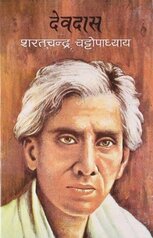 Felt like reading it after watching Dev D. It is so popular that even without reading the book or watching SRK starrer
everyone is atleast vaguely aware of the story.
Felt like reading it after watching Dev D. It is so popular that even without reading the book or watching SRK starrer
everyone is atleast vaguely aware of the story.
Read it just to get the references in Dev D.
किंतु किसी में भी इतना तेज नहीं देखा और आते ही तुमने मुझे चोट पहुँचाई—एक अप्रत्याशित, उपयुक्त, किंतु अनुचित और रूखा व्यवहार किया, घृणा से मुँह फेर लिया और अंत में तमाशे के टिकट की तरह, कुछ देकर चले गए। यह सब याद है!
The Dream Machine: J.C.R. Licklider and the Revolution That Made Computing Personal⌗
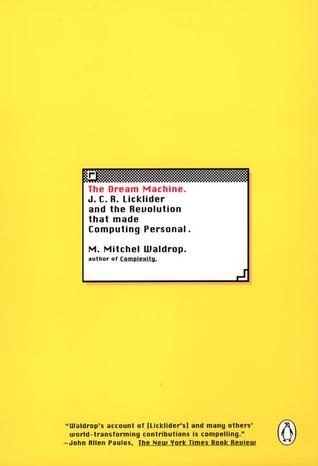
How do you go about building things that no one has built before? This book is 80% revolution that made computing personal and 20% biography of JCR licklider like 2 chapters in the beginning 1 chapter in the end. It feels like a superhero movie as in these pages you can see arcs of so many great inventors and scientists coming together which is so cool to read. I wasn’t interested in biography of Licklider as biography contains many details I’m not personally interested in so I skipped the last chapter which was clearly titled to children of JCR licklider.
Taylor’s motto was “Never hire ‘good’ people, because ten good people together can’t do what a single great one can do.”
Vijaydan Detha ki Lokpriya Kahaniyan⌗
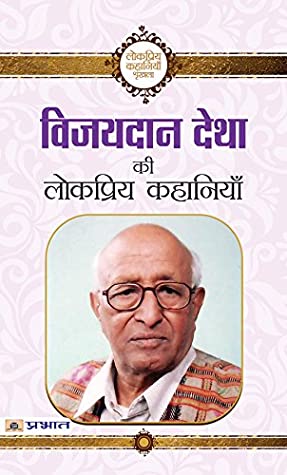
Read it first when I was in school didn’t finish it then. Came to know about Vijaydan Detha when I heard the movie Paheli was adapted from his story titled Duvidha. I love these stories and can relate to them better as they’re closer to home. All selected stories are great, you may have even heard some of them from someone.
पतिव्रता औरतों के तमाशे मैंने बहुत देखे हैं। डर तो फकत बदनामी का है। भेद खुलने का डर न हो तो स्वयं भगवान् भी पाप करने से न चूके। अब जो भी तुम्हारी इच्छा हो, जाहिर कर दो। मैंने तो भूत होकर भी कोई बात नहीं छिपाई।
Jagannath⌗
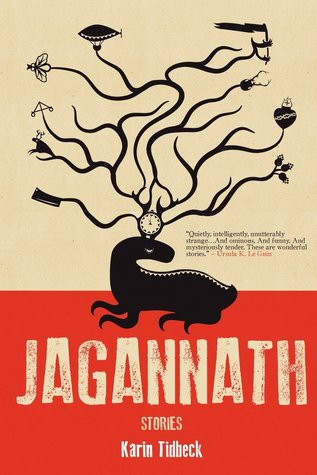
Bizarre and surreal short stories. Some are good like the opening one but I had tough time reading the complete book. There is an incoherence which can be attributed to the fact that English is not the first language of Author which she acknowledges in afterword. I didn’t even understand some of them.
But always in heterosexual configuration. I asked Sigvard what they were doing. We’re multiplying, he said. That’s what people do.
Animal Farm⌗

Allegorical story. You may have seen the same story play out in different countries/places at different point of times. Sequence of events never changes. Rebels become leaders everything is good for some time, system and new rules are established. Populace is kept ignorant or deceived regularly to keep in check. Attributing all the failures and mishaps to a made up public enemy or opposition. A side-project that is never completed but everyone has something to look forward to and occupy their imagination. New rules seep in unnoticed for sole benefit of the lawmakers. General public is worse off than they were earlier.
Somehow it seemed as though the farm had grown richer without making the animals themselves any richer. Except, of course, for the pigs and dogs.
Of Mice and Men⌗
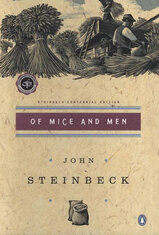
It is a novella you can finish in an hour, low effort and good read. Didn’t get mice stands for in the title. A story about two brothers (related) and their dream to escape drudgery of everyday life and become their own masters which is not realized.
Not that enlightening if you are focused on some takeaways from your reading.
Books ain’t no good. A guy needs somebody to be near him
Men without Women⌗
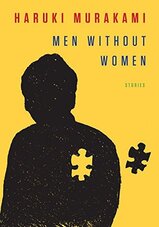
Short story collection by Haruki Murakami. Unlike other collections, title story is at the end. I felt “men without women” was a common theme in all the stories rather than a title of one story. Stories I liked and remember most were “An independent organ” and “Kino”. I would suggest you read metamorphosis by Franz Kafka before reading “Samsa in Love”.
Maybe working on the little things as dutifully and honestly as we can now is how we stay sane when the world is falling apart.
Karmayog⌗
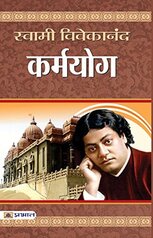
Great book. One of the main ideas are about how work or carrying out one’s duties is equally powerful tool for transformation as penance. Other one is quitting an addiction is harder if done too soon, Swami Vivekananda suggests diving deep in pursuing that addiction, going right through will help in leaving it permanently rather than a quick fix. Working in detached manner to not expect rewards. How ethics and responsibilities change with situation and doing what you want to compound.
Filled with anecdotes and stories like you’ll find in Tales told by mystics by Manoj Das
यह सोचना कि मेरे ऊपर कोई निर्भर है तथा मैं किसी का भला कर सकता हूँ—अत्यंत दुर्बलता का चिह्न है। यह संसार न तो तुम्हारी सहायता का भूखा है और न मेरी।
The Great Mental Models: General Thinking Concepts⌗
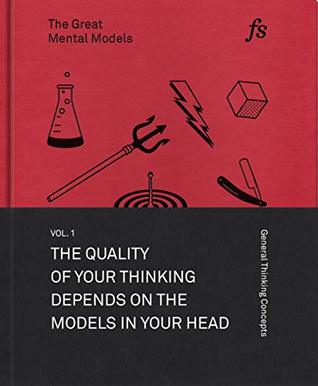
Compiled by the creator of Farnam Street Blog. Book is collection of real life examples categorized by mental models and some commentary from the author.
Learning this way is better than someone instructing you and synthesizing the results for you to digest.
Ego gets in the way, locking reality behind a door that it controls with a gating mechanism. We optimize for short-term ego protection over long-term happiness.
Fahrenheit 451⌗

First book by Bradbury that I read. Interpolating the tech at the time of writing to the era that book is set in is a hard problem for an author. More like how records were destroyed in 1984 and then changed to control past, there is a dedicated department to burn books. Other theme explored is how shallow entertainment is degrading society and makes people complacent. People worrying more about celebrities than family members and someone so caught up in all this that they don’t even remember how they met their better half.
Now I know the inspiration behind the hounds in Kingsman.
The difference between the man who just cuts lawns and a real gardener is in the touching, he said. The lawn-cutter might just as well not have been there at all; the gardener will be there a lifetime.
A Guide to the Good Life: The Ancient Art of Stoic Joy⌗

Meaning of stoic is entirely different from what leading dictionaries tell. This book discusses stoic philosophy, history and how the author incorporates it in his life. A good start to understanding stoics and a collection of gems from stoic literature with deliberate discussion. Book does its job in describing that principles of stoics are not to be taken literally and applying them in your life is simply guided by common sense. Try reading it if you don’t have a philosophy of life or if you’re worrying that you may mislive this life fighting the wrong battles. At the end it also points you to all the right places.
The War of Art⌗

Book is about how hard it is to do creative work and what stops most artists. Can be easily extended to how hard it is to do knowledge work and the roadblocks we’re up against while doing it. I don’t usually read self-helps but what is the point of discriminating, there is nothing to lose. It has its good parts, end of the book is not one of them. Still equips with you the information who your enemy is and it is half the battle.
The Phoenix Project⌗
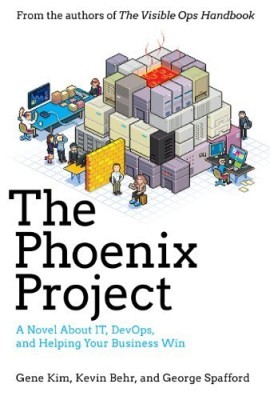
-
Interesting read, way better than teaching all the managerial maxims in a non-fictional manner. Didn’t know that CI and 10 deployments a day is not the norm everywhere and how much amount of work it takes to get there. Still characters are predictable sometimes and more of caricatures of the role they’re in which somehow helps the narration.
-
Recommends The Goal by Eli Goldratt
Pirate Cinema⌗
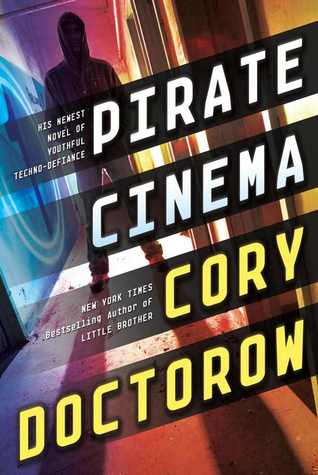
-
A great take on piracy and its implications and the concept of intellectual property. Covers the real-life conflict between megacorps and people over content and culture respectively.
-
From what I’ve read everywhere it is not the best work of author but it felt very good and new to read and tastes are subjective. Loved the way how lively and life-like Cecil and his friends are. Not so predictable David v/s Goliath story.
You can relate this with true story of piratebay, in this podcast
Swipe to unlock⌗
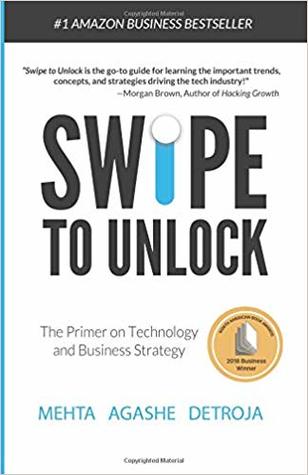
-
Liked the way TCP/IP was explained. Book is written with the intention of being accessible. Not that illuminating for your daily hackernews visitor, but it is good as an introductory book for anyone who wants to make sense of what is going on in the tech world.
-
As the cover says, book is strictly for non coders, coders or someone familiar won’t get much value out of it
1984⌗
 All the time while reading it I was comparing 1984 depicted in the book and some constructs of society today, how telescreens, manufacturing consent through media and surveillance is mainstream today. The book mainly intended as a warning written in 1949 works as a manual in 2020. There are couple of movies based on the book but none matches the cruelty and intensity of the book.
All the time while reading it I was comparing 1984 depicted in the book and some constructs of society today, how telescreens, manufacturing consent through media and surveillance is mainstream today. The book mainly intended as a warning written in 1949 works as a manual in 2020. There are couple of movies based on the book but none matches the cruelty and intensity of the book.
Food rules : An Eater’s manual⌗
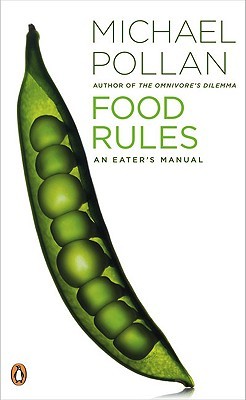 Took a detour from the dry and lengthy books I was reading, it is a short and very spaced out book filled with witty and nicely explained nuggets of food wisdom like “Don’t eat what your grandma won’t recognize as food” to “whiter the bread, sooner you’ll be dead”. No nutritional gobble-de-gook used, everything is stated as simply and coherently it can be.
Took a detour from the dry and lengthy books I was reading, it is a short and very spaced out book filled with witty and nicely explained nuggets of food wisdom like “Don’t eat what your grandma won’t recognize as food” to “whiter the bread, sooner you’ll be dead”. No nutritional gobble-de-gook used, everything is stated as simply and coherently it can be.
The Cuckoo’s Egg: Tracking a Spy through the Maze of Computer Espionage⌗
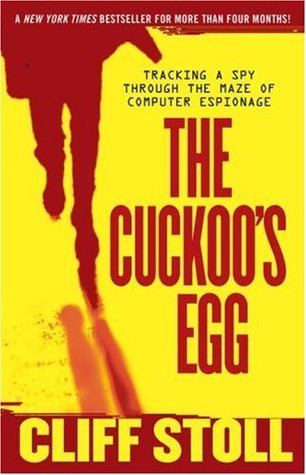 Book is exactly what its title says. At the beginning I thought that the hacker is a warm-up and will be caught at the end of first 20 pages and main course is due after that but you can never imagine how that story spans through about 250 pages and none of it is filler. Loved how it takes you back to earlier time in computing when average computer user had more digital literacy than people have today (technology is so accessible). Above all the story is true and very engaging.
Book is exactly what its title says. At the beginning I thought that the hacker is a warm-up and will be caught at the end of first 20 pages and main course is due after that but you can never imagine how that story spans through about 250 pages and none of it is filler. Loved how it takes you back to earlier time in computing when average computer user had more digital literacy than people have today (technology is so accessible). Above all the story is true and very engaging.
As they say two of the most famous products of Berkeley are LSD and BSD (Unix).
Drive: The Surprising Truth About What Motivates Us⌗
 It refers to flow by Mihaly Csikszentmihalyi numerous times, after reading the first chapter you can get away without reading the rest of the book. Though it has a lot of useful further reading links to explore at the end, which led me to famous essay by Peter Drucker titled Managing oneself published in Harvard business review, more value in that essay than this book but both scratch a different itch. Author defines 3 frameworks of motivation for human beings, citing third framework as somewhat unintuitive and better at explaining things which its predecessors can’t but no framework is valid all the time, there are many situations where motivation 2.0 works.
It refers to flow by Mihaly Csikszentmihalyi numerous times, after reading the first chapter you can get away without reading the rest of the book. Though it has a lot of useful further reading links to explore at the end, which led me to famous essay by Peter Drucker titled Managing oneself published in Harvard business review, more value in that essay than this book but both scratch a different itch. Author defines 3 frameworks of motivation for human beings, citing third framework as somewhat unintuitive and better at explaining things which its predecessors can’t but no framework is valid all the time, there are many situations where motivation 2.0 works.
Permanent Record - Edward Snowden⌗
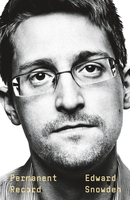 Very engaging read, he has been instrumental for bringing in shift and much needed discussion and action towards more private web and communications. There is also a movie named Snowden, but it would have been much better if they included the scenes where he contacted journalists hopping on different wifi networks by kicking off everyone on the network and stealing creds (but there is so much in this book for a movie to cover). Book doesn’t assume anything about the reader and is very approachable unlike Cuckoo’s Egg where you have to know all that technical stuff to make sense of things.
Very engaging read, he has been instrumental for bringing in shift and much needed discussion and action towards more private web and communications. There is also a movie named Snowden, but it would have been much better if they included the scenes where he contacted journalists hopping on different wifi networks by kicking off everyone on the network and stealing creds (but there is so much in this book for a movie to cover). Book doesn’t assume anything about the reader and is very approachable unlike Cuckoo’s Egg where you have to know all that technical stuff to make sense of things.
A little bit of math can accomplish what all the guns and barbed wire can’t: a little bit of math can keep a secret
The 22 immutable laws of Marketing - Al ries, Jack trout⌗
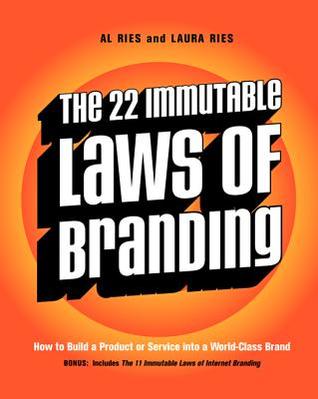
Was reading tools of titans and then author talked about Law of Categories, so finished this book first. Book was written in 1994, and some examples are really outdated (didn’t age well) and funny to read now. Like calling Microsoft’s move to offer all office software under one roof a mistake. There are many successful megacorps today which defy law of line extension. So, instead of laws they’re more of general ideas, because general ideas can accommodate outliers. Many firms discussed are not around today but still it interesting to note why they’re not. An interesting, easy to process book with actionable wisdom.
The Vault of Vishnu⌗
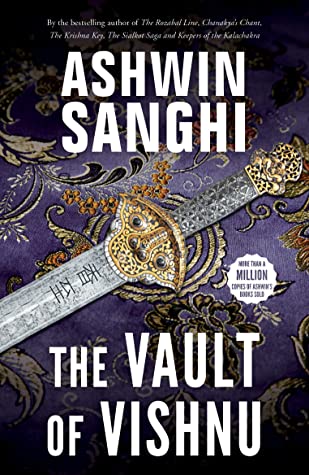
One of the fastest 300 page book you’ll read. Story defies the title of the book though, I don’t know if title was selected before writing the story just because it has alliteration and sounds cool. Premise is really interesting, biologically enhanced soldiers created with age old concoction with a supernatural connection, but execution in the end and climax betrays many of the expectations and is not as interesting as the first 70% pages. References a lot of scriptures and books, I still was not able to find any English translation of Rasavinoda online.
Irresistible : The Rise of Addictive Technology and Business of Keeping Us Hooked⌗
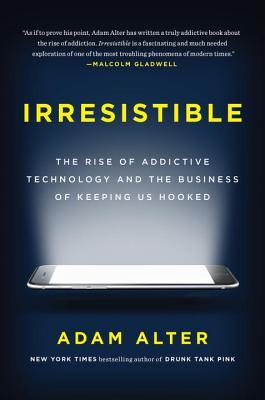
Case study on different addictions, comparing addictions of past to modern digital stimulants which exploit the same reward mechanisms. I didn’t know that someone is called Steve Jobs of gaming industry before reading it. You walk out with a clear understanding of what qualifies as an addiction in general sense, how it works, some ideas on how to make it work in your favour. It is a systematic breakdown of why we do what we do and how addictive experiences around us are engineered. Most striking fact that I learned was that you can’t leave a habit cold turkey, there are parts to it which need to dismantled or just replaced one by one and some caution to be taken to not including the same cues in your environment which will surely result in relapse.
Motivated perception shapes how we take negative feedback, categorizing loss as “almost win” and then coming back for more.
Planet of the Apes⌗
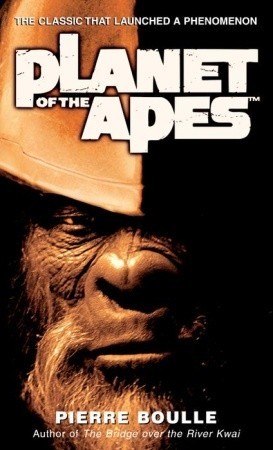
Original book that started all those spin offs and movies sometimes expanding on a few pages of the book or adapting it to a completely new storyline. It is exciting to see how much control a writer has compared to the director of a movie. A writer can direct your attention to even most mundane or subtle things which you’ll otherwise overlook or will seem lost in the sensory overload a movie provides.
Read the book even if you have watched the movies, just read it.
Chitralekha⌗
 Book is an exploration of sin, human nature and effectiveness of imposed abstinence. There are two kinds of abstinence, one is absence of desires and the other is just suppressing them, latter is deteriorating. How most coveted things lose their charm and appeal when you have them and the chaos we create while moving on from one hit to another.
Book is an exploration of sin, human nature and effectiveness of imposed abstinence. There are two kinds of abstinence, one is absence of desires and the other is just suppressing them, latter is deteriorating. How most coveted things lose their charm and appeal when you have them and the chaos we create while moving on from one hit to another.
जीवन एक अविकल पिपासा है। उसे तृप्त करना जीवन का अंत कर देना है। जिसे तुम साधना कहते हो वो आत्मा का हनन है।